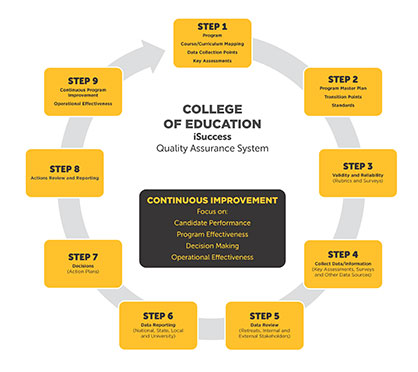Quality Assurance System
iSuccess Quality Assurance System
The College of Education (COE) offers a broad spectrum of high quality programs for new and practicing teachers, administrators, counselors, school psychologists, researchers, and sports management professionals. To ensure success throughout the academic program, the COE has implemented the iSuccess Quality Assurance System powered through Student Learning & Licensure, as its assessment and accountability system that tracks candidate performance, program quality, and unit operations.
The purpose of a quality assurance system is to demonstrate alignment to overarching standards, learning outcomes, and reporting process to develop an efficient, sustainable process for a systematic review of assessment instruments and data for continuous improvement of the program and operational effectiveness of the college.
- iSuccess Quality Assurance System Manual (Document available Spring 2025)
- iSuccess Data Collection Transition Points (pdf)
- iSuccess System Operations and Protocol (pdf)
- iSuccess Grading Process (pdf)
iSuccess Quality Assurance System Process

The iSuccess Quality Assurance System graphic represents the ongoing liner process to develop, analyze, review, report, and review all the internal and external operations of each program, the continuous program improvement action plans again, and measurement of the College of Education’s operational effectiveness aligned to the mission, vision, and goals.
From the starting point (Step 1) of the iSuccess Quality Assurance Systems programs, uses the program goals, expected outcomes, and the program of study to develop a curriculum map to outline the courses, identifying the introduction, reinforcement, and mastery learning level to the overall program learning outcomes. Finally, the program coordinator identifies the key collection points in the program and the key assessments for this step.
The next step is the program master plan, which is a listing of each program signature assignment. Typically each signature assignment identified in each course of the program aligned to national, state, and program standards. The program plan outlines transition points where each student‘s progress in the program is reviewed before moving to the next level of the program. The goal of the data collection from each course in the program is the use the data as one way to measure the students’ program goals.
The validity and reliability process is a vital part of the iSuccess Quality Assurance System. Faculty, internal, reviews each key assessment rubric and survey and external professionals to validate each question meets the content requirement of evidence-based and empirically grounded for data collection.
Data collection and other vital information (key assessments, surveys, and other data collection sources) provide information used to analyze and make programmatic changes and goals.
Data reviews of the program data conducted at faculty and staff retreats involve obtaining comments from internal and external stakeholders (including students, P-12 partners, advisory boards, and other internal and external partners) to review and report on the data shared.
The data reporting step in the process includes all reports and other data analysis outcomes required to submit to national, state, local agencies, and the university.
Decisions from the data collected and reviewed by program faculty, staff, and stakeholders develop into action plans.
The action review and reporting step is the listing of program changes from the action plans developed for each program.
The final step in the iSuccess Quality Assurance system is the ongoing continuous improvement of the College of Education programs and the data measurement of the organizational effectiveness goals. The college uses this information to align data outcomes and action plans to the goals of the college to show continuous program improvement to ensure continuous improvement of candidate performance, program quality, and operational effectiveness to meet the needs of the industry.
